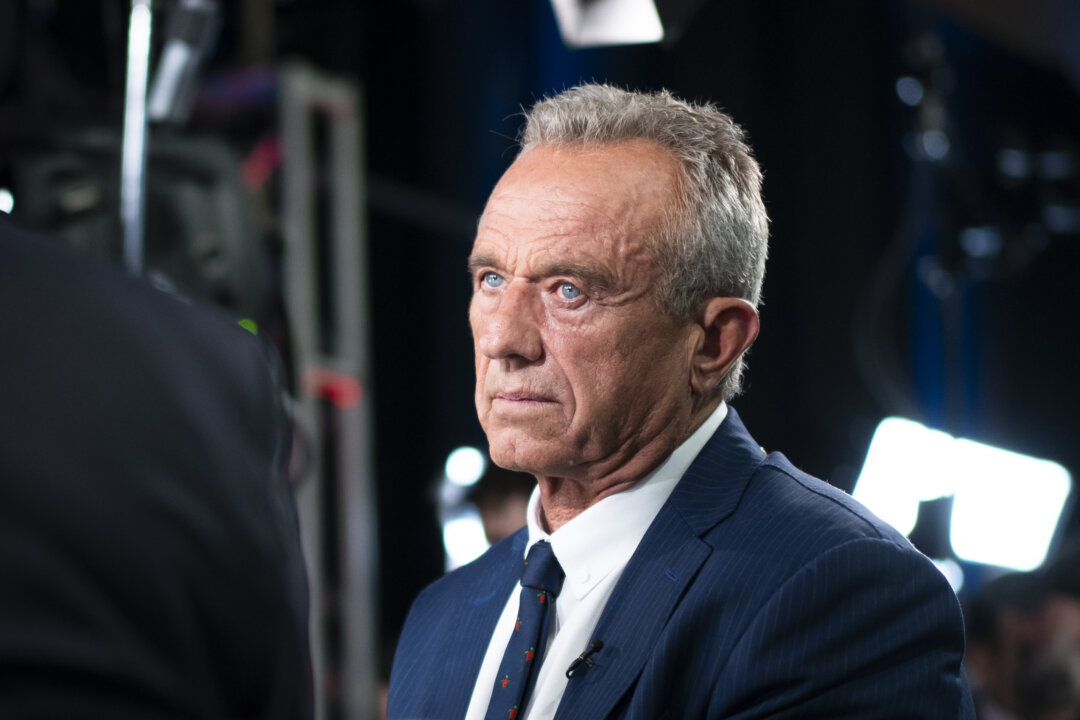The states told the justices that removing Kennedy’s name at this late date was not possible.
The U.S. Supreme Court on Oct. 29 turned down Robert F. Kennedy Jr.’s emergency applications seeking to remove his name from ballots in the swing states of Wisconsin and Michigan.
Early voting in the Nov. 5 presidential and congressional election began on Oct. 22 in Wisconsin and on Oct. 26 in Michigan.
The Supreme Court denied the Wisconsin application without comment. No justices dissented.
The court also did not provide reasons for its decision on the Michigan application, but one justice, Neil Gorsuch, dissented.
Gorsuch said his dissent was based on “substantially the reasons given” by three judges on the U.S. Court of Appeals for the Sixth Circuit who dissented from that court’s Oct. 16 decision denying Kennedy’s request for rehearing.
One of those judges, Amul Thapar, said the question of whether “forcing a person onto the ballot compel[s] his speech in violation of the First Amendment” should be examined by the full circuit court.
“The repercussions of that question are enormous. If a candidate can’t stop his name from appearing on the ballot, could battleground states put President Joe Biden back on their ballots? Could states put anyone they wanted on their ballots (in violation of their election laws)?”
Biden, a Democrat, withdrew from the 2024 presidential contest on July 24.
“These important questions implicate the integrity of our democracy and its elections,” Thapar said.
Kennedy, a Democrat-turned-independent, suspended his campaign on Aug. 23 and endorsed former President Donald Trump, the Republican presidential candidate.
Kennedy has tried to remove his name from ballots in hotly contested states since then. He previously said he was doing this to avoid siphoning votes away from Trump in swing states while leaving room for a longshot bid for the presidency in a possible so-called contingent election, which would put the presidency in the hands of the U.S. House of Representatives in the event of an electoral college deadlock.
The Wisconsin application was filed after the Wisconsin Supreme Court on Sept. 27 rejected Kennedy’s appeal of a lower state court ruling holding that candidates may only be taken off the ballot if they die.
Wisconsin told the justices in an Oct. 28 filing that because ballots have already been printed and voting is currently in progress it would be too difficult at this point to strike Kennedy’s name from the ballot.
Removing Kennedy’s name “one week before the general election … would require the county and municipal clerks of Wisconsin to handcraft and apply millions of stickers to Wisconsin ballots in order to cover his name—at least those ballots that have not already gone to voters and been returned,” the state said.
In his Oct. 23 application, Kennedy said it was his “absolute right” to endorse Trump for president. Not appearing on the ballot “in the critical swing state of Wisconsin” helps to convey his constitutionally-protected message that “he wants everyone who will listen to him to vote for Trump.”
“That is core political speech and it’s protected under the First Amendment,” Kennedy said.
Kennedy added he has “diligently pursued” getting off the Wisconsin ballot for the last two months.
Michigan told the justices in an Oct. 28 brief that “the harm posed by Kennedy’s requested injunction is great.”
More than 1.7 million people in Michigan have already voted and “printing ballots is a complicated and lengthy process.”
“There simply is no ability for the State to direct the reprinting of ballots in all 83 counties, creating ballots which would somehow be offered or only available to a segment of voters, and which would require reprogramming voting equipment across the State.”
U.S. District Judge Denise Page Hood denied Kennedy’s request for an injunction in a Sept. 13 order.
In her decision, the judge recounted that Kennedy asked the Michigan Court of Claims on Aug. 30 to remove his name from the state ballot. The Court of Claims refused, finding that Kennedy’s “interest in withdrawing” from the presidential race was “outweighed by the Natural Law Party’s interest in having a candidate at the top of its ticket.”
The Natural Law Party is a registered political party in Michigan.
Kennedy appealed, and on Sept. 6, the Michigan Court of Appeals reversed.
The state then appealed to the Michigan Supreme Court, which on Sept. 9 reversed the Court of Appeals, finding that Kennedy could not cite “any source of law that prescribes and defines a duty to withdraw a candidate’s name from the ballot.”
Kennedy then appealed to the U.S. Court of Appeals for the Sixth Circuit. On Sept. 27, a divided three-judge panel affirmed Hood’s order.
The panel found Kennedy’s lawsuit was unlikely to succeed on the merits and that the claims he argued had already been finally decided by other courts.
On Oct. 16, the panel reconsidered the lawsuit but left its decision against Kennedy in place. The case was then circulated to the full Sixth Circuit, and a majority of its members voted to deny Kennedy’s request to rehear it.

